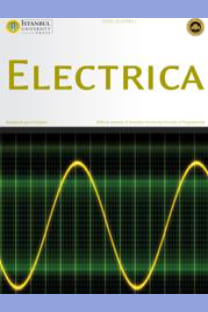Optimal Adjustment of Evolutionary Algorithm-Based Fuzzy Controller for Driving Electric Motor with Computer Interface
___
1. Y. Sun, Y. Liu and L. Li, “Fuzzy, Adaptive control for fractional nonlinear systems with external disturbances and unknown control directions,” Journal of Mathematics, vol. 2020, pp. 1–9, 2020.2. C. C. Hua, Q. G. Wang and X. P. Guan, “Adaptive fuzzy outputfeedback controller design for nonlinear time-delay systems with unknown control direction,” IEEE Transactions on Systems, Man, and Cybernetics. Part B, Cybernetics : A Publication of the IEEE Systems, Man, and Cybernetics Society, vol. 39, No. 2, pp. 363–374, 2009.
3. A. Boulkroune and M. M'saad, “On the design of observer-based fuzzy adaptive controller for nonlinear systems with unknown control gain sign,” Fuzzy Sets and Systems, vol. 201, pp. 71–85, 2012.
4. F. Alonge and F. D’lppolito, “F, F. M. Raimondi and A. Urso, Method for designing Pi-type fuzzy controllers for induction motor drives,” IEE Proceedings.-Control Theory Applicatiıns, vol. 148, no. 1, pp. 61–69, 2001.
5. M. Bodson, J. Chiasson and R. Novotnak, “High-performance induction motor control via input-output linearization,” IEEE Control Systems, vol.14, no. 4, pp. 25–33, 1994.
6. A. Lotfy, M. Kaveh, M. R. Mosavi and A. R. Rahmati, “An enhanced fuzzy controller based on improved genetic algorithm for speed control of Dc motors,” Analog Integr Circ Sig Process, vol. 105, no. 2, 141–155, 2020.
7. Mt. Akbarzadeh, Y. Feerouzbakhsh and B. Feerouzbakhsh, “Evolutionary fuzzy speed regulation for a dc motor,” Proceedings The Twenty-Ninth Southeastern symposium on system theory, 292–296, 1997.
8. N. Kc, Y. Li, D. J. Murray-Smith and K. C. Sharman, “Genetic algorithms applied to fuzzy sliding mode controller design,”, First International Conference on Genetic Algorithms in Engineering Systems: Innovations and Applications, 1995, pp. 220–225.
9. S. K. Suman, G. V. Kumar, “Genetic algorithms techniques based optimal pid tuning for speed control of DC motor,” American Journal of Engineering and Technology Management, vol. 1, no. 4, pp. 59–64, 2016.
10. M. Bulut, “Evaluation the effects of the generation number used genetic algorithms on a Pi-type fuzzy controller,” Intelligent Automation & Soft Computing, vol. 16, no. 2, pp. 163–176, 2010.
11. B. Song, Y. Xiao and L. Xu, “Design of fuzzy Pi controller for brushless Dc motor based on PSO–Gsa algorithm,” Systems Science & Control Engineering, vol. 8, no. 1, pp. 67–77, 2020.
12. T. T. Chen, Li Ths, “Integrated fuzzy Ga-based simplex slidingmode control,” International Journal of Fuzzy Systems, vol. 2, no. 4, pp. 267–276, 2000.
13. C. S. Betancor-Martín, J. Sosa, J. A. Montiel-Nelson and A. VegaMartínez, “Gains tuning of a Pi-fuzzy controller by genetic algorithms,” Engineering Computations, vol. 31, no. 6, pp. 1074–1097, 2014.
14. J. Almeida, V. A. Junior, L. R. Cintra, M. Mendonça, L. B. Souza, and M. A. Montezuma, “Development of a fuzzy controller applied to the velocity of a Dc motor,” International Journal of Advanced Engineering Research and Science, vol. 6, pp. 25–31, 2019.
15. U. Das, P. K. Biswas, “Closed loop speed control of bldc motor drive by using classical controllers with genetic algorithm,” Journal of Power Technologies, vol. 100, no. 2, pp. 161–170, 2020.
16. A. Rawat and Mf. Azeem, “Speed control of brushless Dc motor using modified genetic algorithm tuned fuzzy controller,” Current Journal of Applied Science and Technology, vol. 39, no. 9, pp. 54–64, 2020.
17. O. Castillo, F. Valdez, J. Soria, J. H. Yoon, Z. W. Geem, C. Peraz, P. Ochoa and L. Amador-Angulo, Optimal design of fuzzy systems using differential evolution and harmony search algorithms with dynamic parameter adaptation,” Applied Sciences, vol. 10, no. 18, p. 6146, 2020.
18. M. A. Hannan, J. A. Ali, M. S. Hossain Lipu, A. Mohamed, P. J. Ker, T. M. Indra Mahlia, M. Mansor, A. Hussain, K. M. Muttaqi and Z. Y. Dong, “Role of optimization algorithms based fuzzy controller in achieving induction motor performance enhancement,” Nature Communications, vol. 11, no. 1, p. 3792, 2020.
19. P. Tarigan, S. Sinurat and M. Sinambela, “Implementation of a mamdani fuzzy logic controller for building automation using electronic control based on at89s51”. International Conference on Technology, Informatics, Management, Engineering & Environment (Time-E), 2015, pp. 87–92.
20. D. E. Goldberg, Genetic Algorithms in Search, Optimization, and Machine Learning, addision-wesley, Addison Wesley 1989.
21. J. H. Holmes, “Methods and applications of evolutionary computation in biomedicine,” Journal of Biomedical Informatics, vol. 49, pp. 11–15, 2014.
22. H. C. W. Lau, D. Nakandala and L. Zhao, “Development of a hybrid fuzzy genetic algorithm model for solving transportation scheduling problem,” Journal of Information Systems and Technology Management, vol. 12, No. 3, pp. 505–524, 2015.
- ISSN: 2619-9831
- Yayın Aralığı: 3
- Başlangıç: 2001
- Yayıncı: İstanbul Üniversitesi-Cerrahpaşa
Study on Characteristics and Test Judgment of Electrical Fault of High-Voltage Equipment
Zhumao LU, Tao JIN, Yaning ZHAO
Farzad HABIBI, Farshad KHOSRAVI, Saeed KHARRATI, Shahram KARIMI
Techno-economic Unified OPF Modeling for VSC-HVDC Converter Installation
Sunilkumar AGRAWAL, Prasanta KUNDU
Printed Band-Stop Filter for Mitigation of Electromagnetic Interference
Anjini Kumar TIWARY, Nisha GUPTA
Minutiae-Based Fingerprint Identification Using Gabor Wavelets and CNN Architecture
Non-Imaging Permittivity and Temperature Change Detection by Coherent Microwave Radiometry
Rail-to-Rail Buffer Amplifier with Adaptive Biasing for Flat Panel Displays
